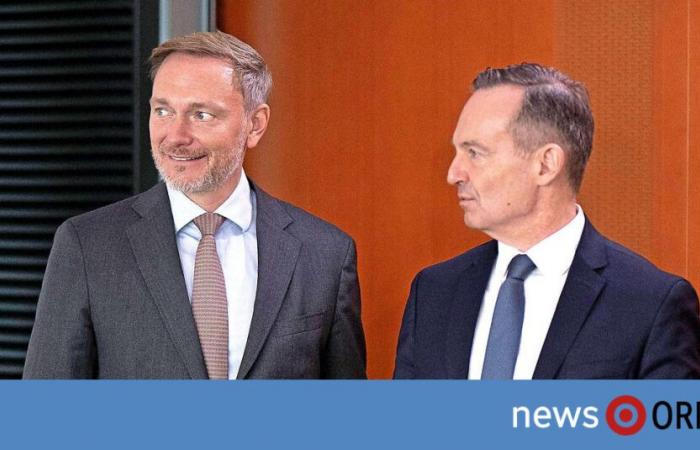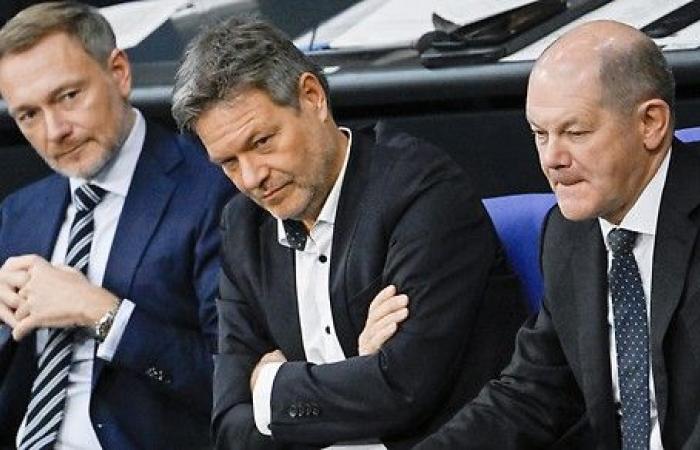Wissing said in Berlin that Scholz asked him whether he was prepared to continue in office under the new conditions. He thought about it and said yes to Scholz. Wissing also announced that he wants to join the government as a non-party in the future – there should be a new election in March at the latest. “I don’t want to be a burden for my party.” That’s why he informed party leader Christian Lindner that he was leaving the FDP.
“I do not distance myself from the basic values of my party and do not want to join another party.” This is a personal decision that does justice to his idea of responsibility. “I want to stay true to myself.”
Reuters/Liesa Johannssen
FDP leadership apparently surprised
FDP parliamentary group leader Christian Dürr had announced the evening before that all of his party’s ministers wanted to submit their resignations to the Federal President. At the beginning of November, the Transport Minister spoke out in favor of the Liberals remaining in the coalition in a guest article for the “Frankfurter Allgemeine Zeitung”. On the same day, a paper by Lindner became known in which he called for a realignment of economic policy – which was the trigger for the final collapse of the coalition, which had been crumbling for a long time.
The “traffic light” broke on Wednesday. After a bitter dispute over direction, particularly over the future course of economic and budget policy, Scholz announced that he would throw Lindner out of the cabinet. Scholz announced that he would ask the Bundestag for a vote of confidence in mid-January. Then an early election in March would be likely. The legislative period normally ends in September.
debate
“Traffic light” burst: Who can get into position best?
Merz calls for a vote of confidence next week
The Union parliamentary group called on Scholz on Thursday morning to ask the vote of confidence in the Bundestag next week at the latest, and not just in mid-January. The “traffic light coalition” had “failed,” said parliamentary group leader Friedrich Merz (CDU) on Thursday after a parliamentary group meeting in Berlin. The Union parliamentary group unanimously decided on the demand that the vote of confidence should take place next week at the latest.
If Scholz clears the way for quick new elections, the Union will examine which legislative projects it can support until then, according to Merz’s attempt to win Scholz over to a quicker timetable. However, he insisted on Thursday that he did not want to ask the vote of confidence in the Bundestag until January. The government will continue to do its work in the coming weeks and months. Scholz and Merz will meet on Thursday to discuss the current situation.
There were calls from the business community – for example from the automobile association VDA and the Federal Association of German Industry (BDI) – for new elections to be held as quickly as possible.
Risky step from Lindner
It is unclear whether there are agreements in the background between Lindner and Merz about future collaboration. The FDP is below the five percent threshold in surveys. She is facing a tough test: Lindner’s actions, who publicly exerted strong pressure on Scholz and Vice Chancellor Robert Habeck from the Greens, are not without controversy among the Liberals.
Jörg Kukies will be the new interim finance minister. The former Goldman Sachs investment banker is a Scholz confidant and was most recently State Secretary in the Chancellery.
German “traffic light coalition” at the end
The German “traffic light coalition” has failed. Germany’s Chancellor Olaf Scholz (SPD) is firing Finance Minister Christian Lindner (FDP), government spokesman Steffen Hebestreit announced on Wednesday evening. Scholz announced that he would ask the vote of confidence in January, so new elections could take place as early as March. The opposition Union called for new elections as quickly as possible.
Memories of 1982
The situation reminds many observers of 1982. At that time, the FDP was in a coalition with the SPD. The then FDP Economics Minister Otto Graf Lambsdorff presented – similar to Lindner now – a policy paper to stimulate the economy.
It contained many measures that were unacceptable to the SPD and its Chancellor Helmut Schmidt. This ultimately led to the coalition breaking up and Schmidt being voted out of office in a vote of no confidence. There was a sudden change of government: the FDP entered into a coalition with Helmut Kohl’s CDU. However, the conditions for a flying coalition change do not currently exist: the FDP and CDU/CSU do not have a majority together.
Cooperation with the AfD would be a breach of a taboo. Merz has also categorically ruled out such a possibility. The SPD and the Greens now want to continue working as a minority government until the spring – and seek changing majorities in the Bundestag for individual projects, but especially the 2025 budget.







